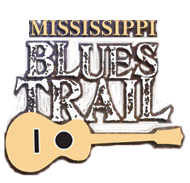Roots of Rock ‘n’ Roll
Roots of Rock ‘n’ Roll - Hattiesburg
Rock and roll is rooted in the blues of Mississippi. The Mississippi Jook Band (brothers Roosevelt and Uaroy Graves and pianist Cooney Vaughan) earned a niche in the annals of rock after they recorded in Hattiesburg in 1936, nearly two decades before rock and roll exploded in the 1950s. The Rolling Stone Illustrated History of Rock & Roll noted that their blues recordings “featured fully formed rock and roll guitar riffs and a stomping rock and roll beat.”
Hattiesburg was the site of a historic series of recording sessions by Mississippi blues, gospel, and country performers in July of 1936, including Roosevelt and Uaroy Graves (both as a gospel duo and as part of the Mississippi Jook Band with Cooney Vaughn), the Edgewater Crows, the Gold Star Quartette, Rev. R. H. Taylor, the Laurel Firemen’s Quartette, the Steelman Sisters, the Madden Community Band, Sunny Spencer and Boy Pugh, Zeke Bingham and Monroe Chapman, Johnson and Lee, Rajah Evans (Jaybird), Benjamin Scott, and Shep and Cooney. Jackson talent scout H. C. Speir told historian Gayle Dean Wardlow that he and recording director W. R. Calaway of the American and Brunswick record corporations set up a temporary studio upstairs in the Hotel Hattiesburg at Mobile and Pine streets. Most of the recordings, however, were never released, and the metal master discs were either scrapped or donated to the recycling effort in World War II. Among the unissued numbers was the Edgewater Crows’ “Mobile Street Stomp,” named in tribute to the historic African American business and entertainment district where many of the musicians lived and worked. In later years several blues and gospel record labels were headquartered on or near Mobile Street.
Only three 78 rpm blues records from the 1936 sessions were issued: one by the Edgewater Crows and two by the Mississippi Jook Band. “Barbecue Bust” and “Dangerous Woman” were cited on the first page of the chapter “Rock Begins” in the 1980 Rolling Stone Illustrated History by critic Robert Palmer, who wrote that the “rocking and reeling” style of gospel exemplified by the Graves brothers “was beginning to influence secular music” at a time when “rock prototypes were already abundant” in the rural South. Wardlow later suggested that an earlier Graves recording, “Crazy About My Baby” from 1929, “could be considered the first rock ‘n’ roll recording.” Roosevelt Graves (1909-1962), who was blind, was born in Summerland, near Laurel. He and his brother traveled around Mississippi playing street corners and churches. In the 1930 census listings they were in Tunica; Speir brought them from McComb to record in Hattiesburg; and Roosevelt spent his final years in Gulfport.
Cooney Vaughn (sometimes spelled Vaughns or Vaughan) also recorded as a member of the duo Shep and Cooney and was reputed by some to be the best pianist in Mississippi during an era when Hattiesburg was known as a hot spot for piano players. Little Brother Montgomery, Gus Perryman, and many others pounded the keys here. Vaughn at one time resided at 515 7th Street, around the corner from the birthplace of his cousin, Blind John Davis, at 707 Whitney Street. (Both sites are just one block northeast of this marker.) Davis became one of Chicago’s most prolific blues session pianists and toured Europe regularly.
content © Mississippi Blues Commission
[ BACK TO TOP ]

